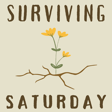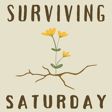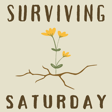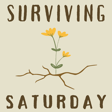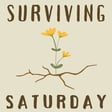
Introducing... The "Surviving Saturday" Podcast!
WARNING: This podcast is NOT for you if all you do is "win win win no matter what," or you are just "slaying" and "slapping" and "living your best life" every day.
Nope. It's for anyone who has encountered super-hard seasons in life. Where you or those you love are struggling or hurting in ways you never dreamed might happen. (Or in ways that you actually dreaded and may even have prayed wouldn't happen.) Maybe you've had a relationship with God at some point, but right now He feels distant, or cruel, or you're not even sure He's real.
Moments of doubt, despair, and disappointment can feel overwhelming. They can cause us to rage, or to go numb; to work harder to try fix it all, or to collapse in exhaustion; to clarify and commit to our deepest desires, or to abandon them in disillusionment.
But maybe, just maybe, these times can also be a proving ground of sorts. What if it's true, as singer/songwriter David Wilcox once sang, "all the roots grow deeper when it's dry"? What if coming to the end of ourselves and our own efforts to manage life isn't an end at all, but a beginning of an altogether different kind?
In this new podcast, licensed mental health counselor Wendy Osborn and her husband Chris share from their 30+ years of marriage what it has looked like to navigate those dark, lonely, and overwhelming seasons we experience as individuals, couples, and families. We'll draw encouragement from remembering what things looked like for Jesus' closest friends and family on the between his death on Friday and His resurrection on Sunday--when Hope sprang back to life and He changed everything about how we might know and relate to a God tenaciously committed to our good.
Brought to you by Nurture Counseling, a counseling, teaching, and training center committed to helping families flourish, one story at a time.
Special thanks to BIll Mallonee for the licensing rights to one of our favorite tunes about relational trainwrecks, and the road back to forgiveness, redemption, and renewal of hope. You can find this tune and more of his music at https://www.billmalloneemusic.com/ or on the Bandcamp app.
